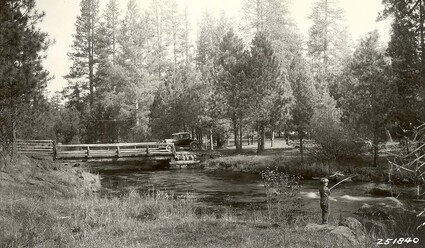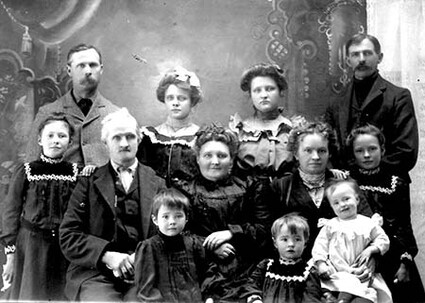The secrets of Allingham Meadow
Last updated 8/23/2022 at Noon
Meadows are rare in the deep forests of Sisters Country. Found near rivers and springs, their deeper loamy soils grow grasses and summer wildflowers and, when wet enough, discourage trees. People have been drawn to meadows for centuries, to camp, graze animals, cultivate grasses, and gaze at a portal to the open sky.
If you park at the Allingham Bridge in Camp Sherman and walk upstream on the west side of the Metolius River Trail, you walk beside Allingham Meadow. First you cross a small spring on a bridge and then wind through shady trees to begin the river trail. There are big ponderosa pines strangely in a row and massive trees with fire scars. It is peaceful and wild.
But if you look very closely you may see wires high up in big pine, a small concrete block in the grass, a fleck of obsidian, or a piece of a pipe in the adjacent forest. With a whiff of campfire smoke from the nearby campground and a little imagination, you might think you hear voices in the sounds of the river, the murmur of a family’s dinner hour, young men laughing, or children’s excitement as they catch a fish.
The first people to rest in the meadows were Native American tribes who came for the good fishing in the first five miles of the Metolius. A river full of spawning “Metolo,” or Chinook salmon. Sockeye salmon runs also came by on their way to Suttle Lake, continuing their long swim from the Pacific Ocean to travel up Lake Creek to their spawning ground in the tiny stream that links Blue Lake and Suttle Lake.
A man named Bob Pyett squatted on the meadow in 1880, building a rough cabin and corral. In 1888, he traded it all for two horses, and Margaret and David Allingham moved in. Pioneers from the Midwest, they expanded the meadow, dug an irrigation ditch from Lake Creek, and raised hay and livestock. In 1890 they bought lumber from the Stanton Mill near Black Butte and built the first real house in the basin. Some sources report they had nine children, but only Dollie, a younger daughter lived with them.
David would herd his cattle on a long journey to The Dalles to sell, while Margaret briefly served as the first postmaster. In 1900, they sold to a Mr. Alley, who eventually traded the place to the U.S. government, and in 1906 the Forest Service moved in and stayed at Allingham for the next 100 years.
Perry South, the first forest ranger of the Metolius, lived there with his wife, Leda, as they started their family. After Perry moved to Sisters, other rangers and forest guards lived at the old ranch house with their families.
An account by Lora Zumwalt, Leda South’s sister, can be found in the classic Sisters history “That Was Yesterday.” Lora describes her demanding life as a guard’s wife from 1918-1924 as she managed the station when her husband, Frank, was gone chasing fires. Lora was responsible for feeding official and nonofficial visitors from her garden, their animals, the fish in the river, and her busy oven. She was allowed to charge 45 cents a meal. The demand for bread from visitors and locals was so great she sometimes baked twice a day, as well as crafting many delicious “cream and lemon pies.” Their Model T would take her to the valley to pick fruit to preserve.
A long line of forest guards and rangers lived in the old ranch house after that. Young men from the Civilian Conservation Corp (CCC), living where Riverside Campground stands today, worked on the irrigation ditch and remodeled the house in 1938. They found walls papered with newspapers, once in 1902, probably by Mr. Alley, and again in 1908 during Perry South’s tenure. They determined Mr. Alley read the Oregon Statesman, NW Pacific Farmer, Home Queen, The Housewife, and the Christian Standard. Perry South preferred the Morning Oregonian and The Dalles Weekly Chronicle.
By 1942, the CCC boys were gone but the need for work crews to fight fires, improve roads, pile brush, and thin trees remained, so the Allingham Project Camp was developed. Details from the 1958 Site Plan show the ranger station, a cookhouse, bunkhouses, and a garage. In an oral history captured by Jill Benhower, longtime Sisters resident, Don Rowe described life in 1957-58 in the old, uninsulated bunkhouses with 20 men and their amazing one-armed cook, Price Garlington.
Price was skillful with his sharp cleaver but Don helped him with some tasks in exchange for a discount on his meals. They ate well, Friday night hamburgers on huge homemade buns, lots of steak and pork chops, and homemade cookies and cakes. The Allingham crew pay was $1.52 an hour and out of that they had to pay back room and board.
Price ran a clean ship, and if anyone skipped the wash basins outside and came in dirty, he stood there with his sharp cleaver and yelled “OUT! You don’t come in my cookhouse looking like that!”
The young men played poker, played tricks on their rivals the Sugarpine Crew on Green Ridge, went to the campgrounds to meet girls, and swam at Scout Lake. Several Camp Sherman ladies married men from the crew. The Trail crew kept their mules in the meadow inside a rickety barbed wire fence. The Allingham crew spent many evening hours chasing stray mules, because they were always getting out.
By 1959, the cookhouse was closed and the crews ate at a restaurant in Camp Sherman. The old guard station house was removed in the 1960s but the cookhouse continued to serve as Forest Service housing into the 1990s. The mules were long gone by the time the bunkhouses were moved to Sisters. Friends of the Metolius volunteers removed scattered tatters of the barbed wire fence to protect wildlife. No trace of the cookhouse remains. It was decommissioned in 2016 by the Oregon Marines.
Allingham Meadow is quiet now. But if you listen closely, it is filled with echoes of the people who lived, loved, and worked alongside a wild river of the West.













Reader Comments(0)